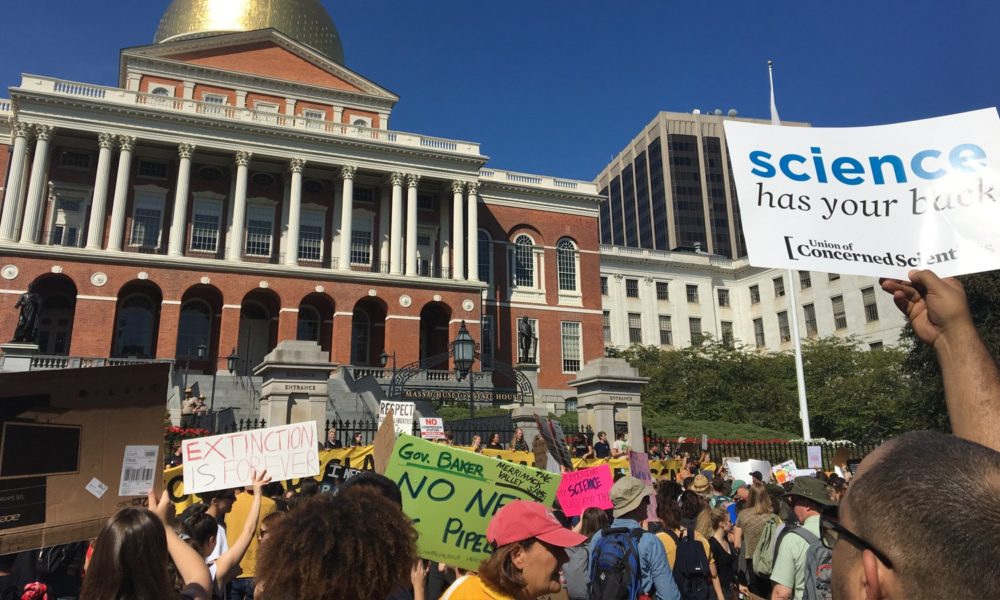The Massachusetts Senate and House have each passed important bills for advancing climate, clean energy, and environmental justice. Here’s how the final steps can land us in the right place for this year.
First, details about a key piece of the first sentence above: It was down to the wire, but the Massachusetts House did indeed pass its climate and justice bill in the last hours of what would have been the regular session, on July 31. Because of the delays and other needs brought on by the pandemic, the House and Senate each took the unusual step of keeping the session going to hammer out agreement on bills that had already passed each chamber by the July end-of-active-session deadline.
Second, what that House bill looked like: The 2050 Roadmap bill (officially, “An Act creating a 2050 roadmap to a clean and thriving commonwealth”) would update the state’s economy-wide emissions reduction target to net-zero by mid-century. It would require the strong interim targets, for 2030 and 2040, that are so important for nailing down our path and helping us avoid detours and dead-ends (like expensive investments in stuff we’re not likely to want later—think natural gas, for example). And it would require attention to (and addressing of) effects on low- and moderate-income households.
Equally importantly, the House did adopt an amendment incorporating the text of an environmental justice bill that we and many allies supported (and, if you’re a Massachusetts resident and contacted your representative in those final days, that you helped get across the finish line). As I described it at that point:
It would protect already burdened communities from added pollution from new projects—a new power plant, for example—and require a focus on community benefits. It would require greater attention to the possible public health impacts of proposed projects. And it would increase community access to information about project proposals by requiring translation and public meeting times that work for community residents [to ensure proper consultation].
The Roadmap bill is a worthy counterpart to the Senate’s own strong bill, “An Act setting next-generation climate policy,” passed in January.

Massachusetts: ready for climate action
Wanted: the best of each
So: two bills focused on many of the same issues, but with different approaches. That’s a recipe for a conference committee. Six members of the legislature are now tasked with working through the two bills and coming up with a compromise to take back to their colleagues.
What we’re looking to the conference committee to provide, of course, is not some least-common-denominator amalgamation, but a bill that combines the best of the Senate and House bills. What might a “greatest hits” compilation include? Here are some pieces:
- A commitment to net-zero by 2050, strong interim targets, and timely action – Each bill has the net-zero-by-2050 language, but also text on setting 2030 and 2040 targets (requiring emissions reductions of at least 50% and 75%, respectively). The Senate bill would also require 2025, 2035, and 2045 limits. We also need the administration to put in place the initial regulations in a timely fashion, and each bill has language about deadlines. The Baker administration has been working on something similar, so dates that mirror those near-term timelines as much as possible make a lot more sense; on that, the Senate version is closer to the mark.
- Environmental justice – A version of the Roadmap language on environmental justice should definitely be in the combined version. As our Massachusetts business-and-advocates clean energy coalition has put it, “It is essential that frontline communities and low-wage workers benefit from the Commonwealth’s transition to a low-carbon economy.”
- Clean energy progress – There are provisions from the House and Senate that would explicitly strengthen the commonwealth’s important efforts around clean energy, most of which the conference committee version should adopt. Removal of barriers to solar adoption for low-income customers and residents of public housing, and addressing of solar net-metering caps to reactivate this job-creating industry in general. Stronger offshore wind requirements. Stronger appliance efficiency standards and building codes. There’s even a (modest) increase in the state’s renewable portfolio standard (RPS) in the House bill.
There are more details on some of those pieces and others (the important role of our land stewardship in addressing climate, for example) in our coalition letter to the conferees.
Another piece I’m also watching closely is on municipal utilities (“municipal light plants”), including the one that serves my town. Muni customers account for almost 15% of Massachusetts’s electricity consumption, which is a huge chunk to have excluded by things like the state RPS. Some munis are moving quickly ahead, but others… just aren’t. It’s incumbent on the state legislature to make sure all residents of the state get to engage in shifting to a clean energy economy and meeting our net-zero goal. We need that provision to be as strong and clear as possible.
Landing in the right place, for now
So much in the headlines these days, and in our own backyards, makes it clear that “investing” in climate action, clean energy, and environmental justice is the right thing to do. Where we need to be on those issues keeps evolving, as climate change keeps getting more serious, and impacts—and disproportionate burdens—more visible. The level of ambition we need from the conferees has never been greater.
The work of the conference committee at this point is to come up with as strong a bill as they can for this session, drawing on the good work done by their colleagues in the House and the Senate. None of the good pieces in the Roadmap and Next-Generation Climate bills should have to wait.

